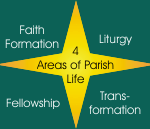

 |
|
 |
|
Homily for October 23rd, 2005.
Caution: Putting a Sunday homily on the Website is tricky business. All the viewer has is a written text. A homily, on the other hand, is "an oral event". It may not have been said or heard the way it was written. In addition, a roughly ten-minute homily is part of a roughly one-hour worship event in which God and God's people communicate with each other by means of ritual, symbol, song, proclamation, prayer. Not everything in these homilies is original. As a homilist, I rely on and at times borrow from other homilists and writers who are not properly mentioned in this format. I am often indebted to them. Father William Marrevee, s.c.j.
30th Sunday Ordinary Time Year A We have heard it all before: Love God above all else, love your neighbour as yourself. It is old hat. So familiar… What new insights can be gained from reflecting on it? What it comes down to is: How real is our love of God? Is it just a pious platitude? It is nice (and easy) to sing “I love you, Lord, my strength.” (psalm response) How authentic is it? Show me. The apostle John has reworked the same words of Jesus in one of his letters: “Anyone who says ‘I love God’ and hates his brother/sister is a liar. Whoever does not love the brother/sister whom he can see cannot love God whom he cannot see. Whoever loves God must also love his brother/sister.” One commentator summarized it with a bit of an edge: “Are we lovers or liars?” The issue is that the love of the unseen, holy God must come alive in the authentic, tangible and consistent love of one’s very visible neighbour. It is still vague…, but if you then see what the first reading, the Old Testament text, which is linked with the Gospel passage, says it is anything but vague. That text from the book of Exodus is concerned with social conditions and social justice for the powerless. In the Bible orphans and widows are today’s vulnerable, defenseless people, the ones that fall through the cracks. The last line of that reading gives that sort of love a unique twist and really implicates God: “If your neighbour cries out to me, I will listen, for I am compassionate.” That compassion of God was embodied in Jesus Christ and needs to be embodied in our active care for those in need. There is a letter from a 2 nd century non-Christian author written to Emperor Hadrian after he had observed the behaviour of a Christian community: “Christians love one another. They never fail to help widows; they save orphans from harm. If one of them has something, they give freely to those who have nothing. If they see a stranger, they take him home and are happy, as though he were a real brother. They don’t consider themselves brothers/sisters in the usual sense, but brothers/sisters instead through the Spirit, in God. And if they hear that one of them is in jail or persecuted for professing the name of their redeemer, they all give him what he needs…. This is really a new kind of person. There is something divine in them.” Would an outsider today make a similar observation about us? |
|||||
| © Copyright 2025 Our Lady of Victory / St-Malachy Site
490 Charles Street • Gatineau • Quebec • J8L 2K5 Telephone: (819) 986-3763 Website powered by Arvixe Web Hosting |